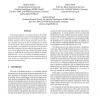Free Online Productivity Tools
i2Speak
i2Symbol
i2OCR
iTex2Img
iWeb2Print
iWeb2Shot
i2Type
iPdf2Split
iPdf2Merge
i2Bopomofo
i2Arabic
i2Style
i2Image
i2PDF
iLatex2Rtf
Sci2ools
ICDAR
1999
IEEE
1999
IEEE
On the Evaluation of Document Analysis Components by Recall, Precision, and Accuracy
In document analysis, it is common to prove the usefulness of a component by an experimental evaluation. By applying the respective algorithms to a test sample, some effectiveness measures such as recall, precision, and accuracy are computed. The goal of such an evaluation is two-fold: on the one hand it shows that the absolute effectiveness of the algorithm is acceptable for practical use. On the other hand, the evaluation can prove that the algorithm has a better or worse effectiveness than another algorithm. In this paper we argue that the experimental evaluation on relative small test sets
Related Content
| Added | 03 Aug 2010 |
| Updated | 03 Aug 2010 |
| Type | Conference |
| Year | 1999 |
| Where | ICDAR |
| Authors | Markus Junker, Andreas Dengel, Rainer Hoch |
Comments (0)

